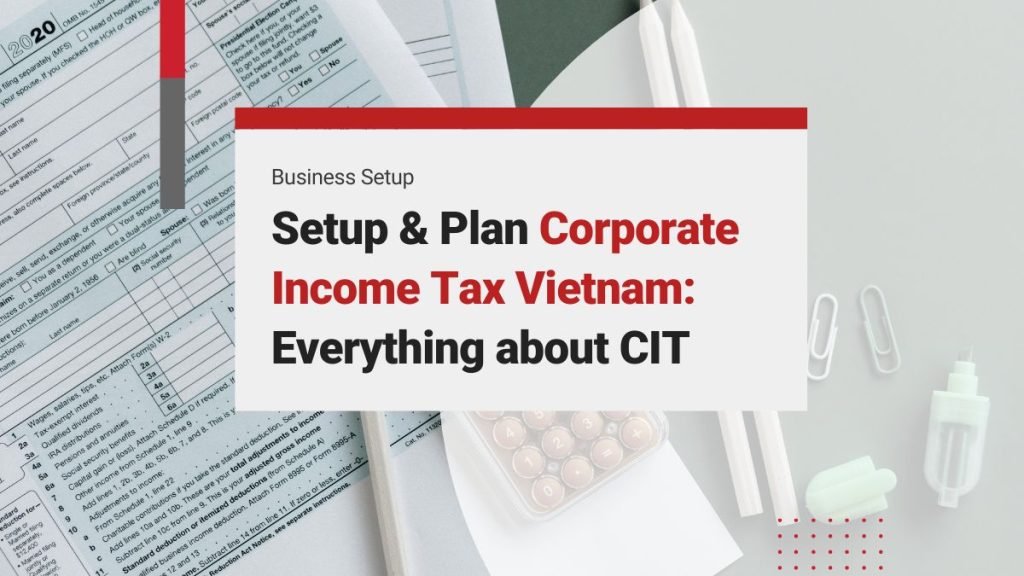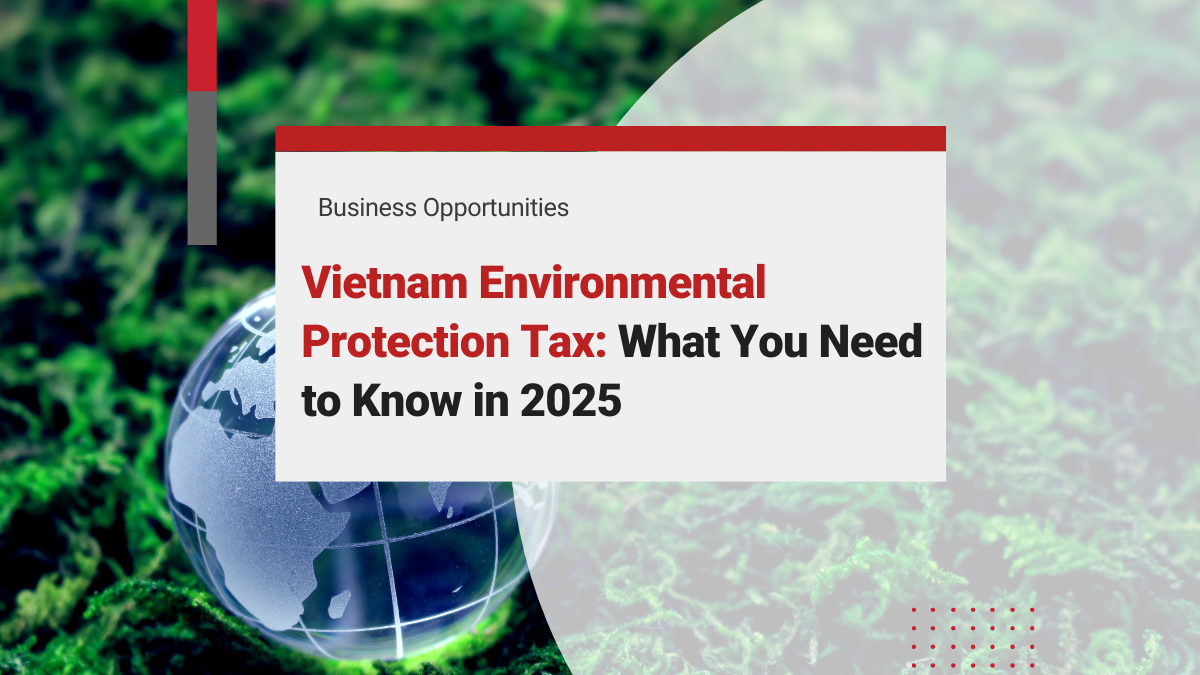Corporate income tax Vietnam laws and compliance are often complex and time-consuming, and the regulations change quite frequently due to the fact that Vietnam is still developing its economy. Several lodgments may be required on an annual or quarterly basis based on your company’s industry, size and invoicing amount.
Find out more about InCorp Vietnam’s Tax Advisory Services for Foreign Business
Corporate tax filing is not something you should do on your own and using a tax professional is extremely critical. Even if you engage a tax expert, as a business owner yourself, you will also need to know your corporate tax obligations in Vietnam and how they can affect your company’s bottom line.
Here are the steps you absolutely have to know when managing your corporate income tax processes in Vietnam.
Steps to Manage Your Corporate Income Tax (CIT) Vietnam
1. Identify the effective corporate income tax rates and deadlines
In Vietnam, assessable income is used to calculate corporate income tax. The formula goes like this:
CIT Payable = Assessable Income x CIT Rate
And the assessable income is calculated with this formula:
Total Corporate Revenue – Deductible Corporate Expenses + Other Incomes – Carried Forward Losses
The CIT rate is different depending on the type of business: 20% for standard CIT (the most prevalent CIT for most industries) and a protected 32% – 50% for oil and gas sectors, and other extractive industries. However, if your business operates in certain encouraged industries, however, tax incentives are available in the form of preferential tax rates, which we will detail below.
Filing deadline: 31st of March of the following year
Read More: Unlocking Corporate Income Tax Secrets in Vietnam: A Comprehensive Overview
2. Know the corporate income tax incentives and take advantage of them
There are different corporate tax incentives in Vietnam and the government decides if your company can take advantage of them based on the encouraged sectors, type of investment projects, locations, and project scales. Good news for SME businesses, the Vietnamese government will release tax incentives to SMEs that decrease SMEs’ primary tax rates. The tax incentives usually are 5%, 10%, or 15% according to the industries. The defined industries usually fall in the tech realm, like IT, Software Development and Blockchain technology.
Encouraged sectors for tax incentives include software development, information technology, high-tech companies, education, environmental protection, healthcare, aquatic and agricultural products processing, scientific research, infrastructure development, and renewable energy. To know what locations, project scales, preferential tax rates, and tax holidays and exemptions are applicable for corporate tax incentives, get in touch with a market entry consulting company whose tax consultants can help you navigate the country’s taxes.
3. Maintain compliance with CIT regulations through consistent annual and quarterly tax planning
Businesses have to calculate their provisional corporate income tax and submit it within 30 days after every quarter. As for the annual final corporate income tax return, known as tax finalization, companies need to calculate and remit any CIT payable balance within 90 days after each financial year. Should the company pay more CIT than what is due, refunds will be issued within six months.
For the 2021 tax year, the total provisional corporate income tax paid during the first three quarters must be at least 75% of the estimated amount for the whole year (specified in Decree 126/2020/ND-CP). If not paid in full, late payment interest will be assessed on the arrears from the third-quarter corporate income tax payment deadline until the date of settlement of the arrears.
However, a government draft is due soon (announced in February 2022) to correct this Article due to the risk of over- or under-estimation of the annual payable amount. The modification will require businesses to pay at least 80% of all four quarters’ CIT by the fourth quarterly deadline mentioned above. After that, any remaining amount shall be paid by the annual finalization date.
All tax declarations and submissions that don’t meet the deadline are subject to late fees and penalties. Although the penalty for a late CIT declaration can vary greatly, late submission fines are generally calculated as 0.03% of the payable tax per day.
In Vietnam, January 1 to December 31 is the standard financial year. However, given the special conditions, companies in Vietnam are allowed to adopt their own financial year (based on their parent company or home country) which must be reported to the government.
NOTE: the deadline to file your corporate tax finalization is the 31st of March of the following calendar year.
Read Related: Financial Statement in Vietnam: Types, Deadlines, and Financial Year vs. Fiscal Year Differences
4. Maximize tax-deductible expenses to manage corporate tax liability efficiently
In general, necessary expenses for operating a business in Vietnam are basically all tax-deductible. These expenses are salaries, supplies and equipment, office and building rent, accounting and tax services, legal services, utility costs, etc. However, the expenses incurred must meet certain criteria to be eligible for deduction.
There are two main criteria for determining whether an expense can be incurred without tax. Firstly, there must be an official receipt or invoice of the transaction, which are to be indexed and processed by your accountants. Secondly, the expense must conform to the activities of your line of business and industry. For example, a SaaS company would likely not have an appropriate use for a stock warehouse.
Read Related: The Most Common Tax Infringements in Vietnam and How to Avoid Them
5. Some important changes of a new Law on Corporate Income Tax starting from 1 October 2025
The National Assembly of Vietnam has officially ratified a new Law on Corporate Income Tax (CIT), which will come into effect on 1 October 2025 and apply for the tax year 2025 onward. A significant change is the formal inclusion of foreign enterprises conducting business via e-commerce and digital platforms within the CIT scope. These platforms are now considered permanent establishments, which may affect eligibility for double taxation agreement exemptions.
Additionally, the new law introduces fresh profit exemptions for income from initial carbon credit and green bond transfers, green bond interest, direct state budget support, and income from the Government-established Investment Support Fund.
While the standard CIT rate remains at 20%, smaller enterprises now benefit from reduced rates of 15% and 17%, depending on their annual revenue. However, these rates do not apply to SMEs affiliated with larger enterprises. Deemed CIT rates will also be imposed on specific cases and detailed in an upcoming decree.
6. New incentives on CIT for 2025
In terms of incentives, the new CIT Law expands the list of eligible sectors. These now include certain digital technology services and products, AI data centers, semiconductor chip R&D and manufacturing, automobile assembly, and SME support services such as incubation and technical assistance. These targeted sectors align with Vietnam’s economic priorities, particularly in high-tech and innovation-driven industries. This move aims to attract more investment into areas that are seen as strategic to national development, such as digital transformation and sustainable technology.
Conversely, several traditional CIT incentives are being scaled back. Location-based tax breaks for new or expanded projects in industrial zones have been eliminated, removing the popular “2 years exemption and 4 years reduction” benefit. Incentives for projects in economic zones are also reduced unless located in designated difficult socioeconomic areas. Additionally, new investment projects with capital exceeding VND 6 trillion no longer automatically qualify for incentives. However, expansion projects can still access previous incentives if those are still valid, or apply new incentives under certain conditions, provided they are accounted for separately. These updates reflect a more selective and strategic approach to tax incentives, shifting focus from broad geographic preferences to targeted sectoral support.
How InCorp Vietnam can help?
InCorp Vietnam offers expert tax advisory and outsourcing services tailored to both local and foreign businesses navigating Vietnam’s evolving corporate income tax landscape. With deep knowledge of local regulations and the upcoming 2025 CIT law changes, InCorp Vietnam helps companies optimize their tax planning, ensure full compliance with filing requirements, and identify applicable tax incentives. From setting up tax-efficient structures to managing quarterly and annual filings, their experienced consultants provide strategic support that minimizes risk and maximizes cost-efficiency. Whether you’re establishing a new entity or expanding operations, InCorp Vietnam simplifies the complexity of CIT so you can focus on growing your business.
Find out more about InCorp Vietnam’s Tax Advisory Services for Foreign Business

clients worldwide

professional staff

incorporated entities in 10 years

compliance transactions yearly







